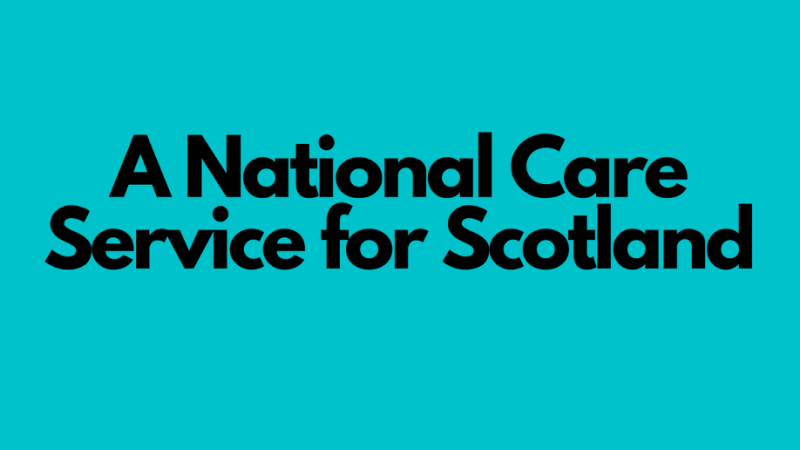In the news
Scotland’s National Care Service – DOA or fighting fit?
Following the SNP’s proposal to create a National Care Service to cope with the issues plaguing the sector, critics have questioned the reforms on the grounds that they are costly and bureaucratic. With Nicola Sturgeon’s resignation and her party embroiled in scandal, the proposal is currently in hiatus.
SNP remain committed to delivering manifesto pledge
The National Care Service was put forward by the SNP to centralise Scottish care services into one body run by the Scottish Government. This new body would be split regionally, with care providers answerable to ministers in Holyrood rather than local councils.
Having been introduced to Parliament on 20 June, the National Care Service (Scotland) Bill was put on hold until after the SNP leadership contest had concluded. Scottish Health Secretary Michael Matheson claims the SNP is still keen to deliver on their 2021 manifesto: “The creation of a National Care Service is about making sure we see greater consistency, accountability, and level of service that’s being provided, particularly within a social care setting.”
However, following criticism from opposition MSPs, the Unite union and others, demands for the bill to be delayed have been ramped up.
In February 2023, a number of organisations including trade unions such as the Scottish TUC and charities like Parkinson’s UK, wrote to Nicola Sturgeon to express their concerns regarding the National Care Service plan.
Roz Foyer, the general secretary of the STUC, warned “there is a real risk these plans will create a schism between the Government and wider civic Scotland which the Scottish Parliament’s own committee has condemned as 'dangerous'.”
For critics, a key concern is the lack of evidence for the National Care Service being able to improve the care sector in ways that local authorities would be unable to achieve themselves. The proposed budget has also rung alarm bells with fears they will require cuts elsewhere.
Robert Kilgour, Executive Chairman of Renaissance Care, commented that he is “not convinced it’s going to improve things on the front line. Just introducing a national care service won’t necessarily improve care”. He added that he is worried “it’s a political marketing exercise. [And that] it’s a further land grab for central control.”
Paul Kelly, the health and social care spokesperson for COSLA (The Convention of Scottish Local Authorities) is also apprehensive. He has concerns regarding the plan’s funding, stating: “It is inconceivable that the Scottish government has put forward a budget that would see real-term cuts to front line care services, whilst proceeding with centralising structural reforms.”
With considerable uncertainty around the SNP’s legislative plans for the sector coupled with mounting pressure on care providers in general, William Moyes, chair of the Accounts Commission at Audit Scotland says “change is needed now - it cannot wait for a National Care Service."
The social care minister for Scotland, Maree Todd, has responded to critics, stating: “Health and Social Care Partnerships received an additional £528 million for 2022-23 to improve care and to increase staff pay and we are working with those who access and provide care to design how the NCS will work.”
Interview
This month we sat down with Craig Hoy MSP, Shadow Minister for Social Care, to understand his perspective on the SNP's proposal for a National Care Service.

What are the implications of the SNP's proposals for a National Care Service in Scotland?
The SNP’s National Care Service proposal would centralise Scottish social care by taking decision-making away from local authorities and care providers and putting it in the control of Scottish Ministers and a bloated billion-pound bureaucracy.
The proposals have been challenged by third sector organisations and politicians from every major political party in Scotland, which is why the Government has now paused this legislation at the first stage.
While the Scottish Government has stripped local authorities of funding, they plan to centralise social care at a cost of up to £1.3 billion to employ up to 700 civil servants and set up the service over the first five years. This is the last thing a system already in crisis needs right now.
How can social care become a fit for purpose sector with appropriate funding levels without a national body to represent and fight for it?
Social care in Scotland is not fit for purpose, and creating a National Care Service simply diverts money and decision-making away from the frontline.
The majority of UNISON members have expressed concerns about its implications.
At a time when social care staff are already stretched and many are considering leaving the social care sector altogether, it is counter intuitive to focus resources on creating a body which is unwanted by those working, or receiving care, within it.
Social care in Scotland is not fit for purpose, and creating a National Care Service simply diverts money and decision-making away from the frontline.
For our social care to be fit for purpose, the Scottish Government needs to resolve issues relating to pay, terms and conditions for social care staff which have resulted in high rates of turnover.
They must also improve training opportunities for care staff and managers and engage more with social care professionals.
How would a Scottish Conservative government go about improving pay and conditions for those working in the sector?
I recognise pay, conditions and career progression need to be improved within the sector if we are to retain care workers in the service.
To address the problem the Scottish Conservatives would divert funding from the SNP’s National Care Service directly to frontline care.
We would build minimum pay, terms and conditions into the commissioning and procurement of care, ensure that commissioned care services reward length of service and positive job performance with pay progression, empower the Scottish Social Services Council to provide accessible training and qualifications for carers and amend the Carers Act to provide unpaid carers with automatic rights to support breaks from caring.
Social care workers play a pivotal role in our society and steps need to be taken to resolve the crisis in our social care system now, not in over five years’ time after the introduction of a costly and bureaucratic National Care Service.
How would a Local Care Service underpinned by a 'Local Care Guarantee' better serve those in need of care in Scotland?
A ‘local care guarantee’ would mean that no individual would be forced to access care miles away from their community, family and support networks. This means keeping care within the community and giving social care service users agency to access care locally.
Many of the terrible experiences charted in Scotland’s social care system stem from a lack of personal agency and diversity of choice. The SNP Government, local authorities, health boards, integration boards and providers should place individual choice and control at the heart of everything they do in relation to social care. Often this means supporting people to live independently and in their own homes as far as possible.
Opinion
Jackie Baillie, Scottish Labour MSP and Spokesperson for Health, Social Care and Equalities sets out her thoughts regarding the SNP’s proposal for a National Care Service.

The Unfulfilled Potential of Scotland's National Care Service Vision
Many of us involved in politics and governance have long appreciated the absolutely vital role that social care plays as a key partner to the NHS. For others, the pandemic revealed just how essential social care is for our society. Overnight, the people of the UK recognised the incredible contribution that care workers make – including in the most dangerous of situations.
As such, I was delighted when the SNP government – which until that point had nothing of note to say about social care or the workforce – announced it would seek to legislate for a National Care Service.
The idea of a National Care Service to lift standards and support the workforce was first developed by Scottish Labour over a decade ago – while Nicola Sturgeon was adamantly opposed to the plan at the time, I was very encouraged to watch her Damascene conversion to the cause of reform.
But as the excitement dissipated, it became clear that what the SNP really had in mind was not the National Care Service that Scotland needed. Rather than transforming culture, the SNP focused on structures, and rather than focusing on improving staff conditions, the SNP focused on spin. Instead of listening to the workforce and the trade unions, the SNP spent a fortune on consultancy firms.
The resulting plan was nothing more than a power grab from local councils that would do nothing for the workforce
And the resulting plan was nothing more than a power grab from local councils that would do nothing for the workforce, make little impact on care standards and completely fail to reform the sector as needed. What the SNP offered us was nothing more than a National Centralisation Service which will do nothing to support those receiving care or help the workforce. Fresh from months of defending the bill to the hilt, Health Secretary Humza Yousaf was more than happy to concede the need to put the bill on the backburner as part of his SNP leadership election.
It seems that the prospect of career advancement is enough to make any SNP spokesperson perform an about-turn on just about any issue. And while this bill is stuck in legislative limbo, thousands of Scots are still paying through the nose for non-residential care charges that the SNP promised to scrap years ago. For the workforce – much applauded, but little rewarded – nothing has changed. Instead, the SNP has time and again lined up with the Tories to vote against Labour proposals to boost their pay.
Scotland’s care workers and those for whom they care do not need promises of jam tomorrow – they need reform now. That’s why Labour remains committed to real and meaningful reform of the care sector, giving it equal value to the NHS, which will also help to tackle the crisis in our NHS. Reform that puts workers and those receiving care before government mandarins and consultancy firms. Reform that can change lives and build a solid foundation for looking after the most in need in our society. While the SNP turn their gaze inwards, it is the Scottish Labour party that is listening to care workers and planning the care sector of tomorrow.



